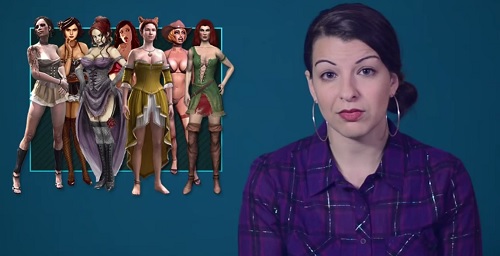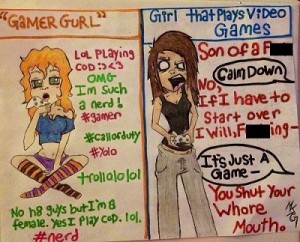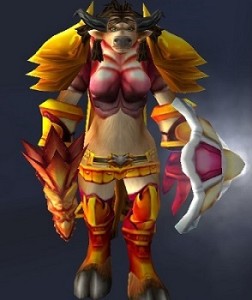This is a guest post by friend of the Recorder, Molly Schlemmer, who expressed interest in writing about a frightfully topical issue, one in which she has the full support of the Addison Recorder.
I am a gamer. I am also a woman, which makes me one of those mythic “girl gamers.” About a week ago Andrew Rostan shared this article from The Mary Sue on Facebook. My stomach sank as I read it. Was the gaming world really going to do this again?
Player One and Player Two
If you haven’t been keeping up with the events of #GamerGate, here’s a summary. First, game developer Zoë Quinn became the center of a campaign of harassment after her ex-boyfriend, Eron Gjoni, alleged she had an affair with Kotaku‘s Nathan Grayson which coincided with Grayson mentioning her on the popular gaming website. Gjoni later retracted his claim, but not before 4chan bombarded Quinn with rape and death threats, circulated nude pictures of her along with her home address, and harassed those who defended her. Worse, it now appears that Quinn’s ex may have had a big hand in orchestrating her harassment.
Then, Anita Sarkeesian of Feminist Frequency posted the latest episode of her series Tropes vs. Women in Video Games. Sarkeesian’s critique (NSFW, but please take the time to watch it) focuses on the way games use violence against women to make the game world seem grittier; to create shock for the gamer; and to help develop the main antagonist or anti-hero protagonist of the game. The response she commonly receives to this critique is especially telling: that, in fantasy worlds where health magically regenerates and dragons fly through quasi-historical settings, games wouldn’t be as “believable” without this violence.
Sarkeesian is a favorite target of anger in the gaming community, starting last year with her very successful Kickstarter to fund Tropes vs. Women in Video Games, but for some reason this video kicked off another firestorm. While she weathered most of the Kickstarter-related vitriol relatively well — vitriol which included a Flash game where you “beat up” a picture of Sarkeesian (I wish I was making this up; also, NSFW) — this time she was driven out of her home by the threats like this nausea-inducing example she posted (trigger warning, and did I mention NSFW?).
Those uniting under the #GamerGate hashtag are attempting to make their issues with these two women about ethics in game journalism, an argument that is increasingly laughable as journalists and game devs are harassed to the point of leaving the industry. The real reason for #GamerGate is easy to see: using violent harassment against women in order to silence them. As indie game designer ella guro writes in her post On “Gamers” and Identity:
Fantasizing about committing acts of violence on the people who you perceive to be the architects of your misery is one of our grotesque cultural pastimes, one that the culture of aggressively-masculine marketing around videogames has certainly only just added fuel of the fire of – one that’s constantly enacted on the beings and bodies of the weak and marginalized.
(Full disclosure: ella and I are childhood friends, and played countless hours of video games together while growing up.)
Gaming While Female
You can imagine my horror that weekend as I watched my my brothers in virtual arms attack two women simply because these women dared to stretch the bounds of our community. Watched as their gender was used against them in order to silence their opinions and shut them down. Saw anyone who agreed with them, be they male or female, get dogpiled by the mob because their opinion was “wrong.” It was enough to make me feel deeply unwelcome and unsafe in a community I have long called home. I doubt I was the only one, either.
So where does this leave me and the other women who now make up 48% of the game buying audience? We’re certainly not immune from being harassed by our fellow male gamers. From microagressions like hearing “Girls don’t play X…” and having a game store employee talk entirely to your boyfriend when you’re the one asking the questions (true story), to more overt cases like the ones documented on the blog Fat, Ugly, or Slutty (NSFW, yet again), female gamers face an increasing amount of abuse from our male compatriots.
Some women are hounded by their World of Warcraft guildmates to talk more in voice chat because their “voice is sexy.” Others try to report their harassers only to be stonewalled by the companies tasked with enforcing their own Terms of Service. We’re “fake” when we’re found attractive and “fat” when we’re not, because god forbid we play video games because we like them. More and more, the message from a large section of male gamers becomes “this is our clubhouse; we’re entitled to treat you however we want, and if you dare step out of line we’ll hurt you.”
And to a certain extent, I get why they feel that way.
Walking A Mile In Their Pegasus Boots
ella guro points out that video games are “the thing that keeps you going, feeling free, feeling connected to people, and feeling like you’re someone.” Video games have given countless people a sense of belonging where they otherwise had none. The industry took note of this and began shoring up the identity of their larger male demographic with hyper-macho protagonists, booth babes, and extreme violence. All of this has cultivated a boys-only atmosphere for the past several years that has left a certain section of the community feeling entitled to the identity of “gamer.”
Now, though, the boys-only gaming identity is being challenged by an increasingly female demographic who love playing games just as much as the men do, but start to feel alienated when, say, the only visibly female enemy in Bayonetta can be killed with the only sexually explicit “Torture Attack” in the game. Then someone like Anita Sarkeesian comes along wanting to do a researched, academic critique of how women are portrayed in video games, and suddenly it feels like your entire identity is being called into question.
And this person is a woman? Well, video games have taught us how to deal with women…
Gaming While Female
But here’s the thing: I’ve been in the clubhouse for nearly as long if not longer than many of those uniting under the #GamerGate banner. Going to our parents’ friends’ parties because meant getting to play Duck Hunt on the NES with the other kids while all of our parents chatted. “Santa” brought my sister and I a Super NES, and I got my first Game Boy for my birthday just a few months later.
I’ve traveled across Hyrule many times over, fully leveled my Knights of the Round materia, fought my way through the twisted ruins of Rapture, and defeated some of the biggest bad guys Azeroth has to offer. It’s not like I’m the only one to have done so either. Girl gamers are not some new and rare creature; we’ve been around for ages now.
In other words, the clubhouse may have been catering to men, but it’s never been exclusive. It’s time to stop pretending it ever was, and make it more welcoming to everyone.
Does that mean video games need to stop portraying sex and violence? Hell no! I like Bayonetta and Saints Row as much as anyone else, but I can also acknowledge their flaws and wish for more strong female heroes (looking at you, Ubisoft) who don’t exist solely to titillate the herterosexual male audience. I can wish for women in video games to be a little more covered even as I put my Tauren paladin in every armorkini I can find. And I can definitely wish for game developers to stop using violence against nameless female NPCs purely for shock value.
Women have been in the clubhouse for decades now. We’d like to get some service finally.








